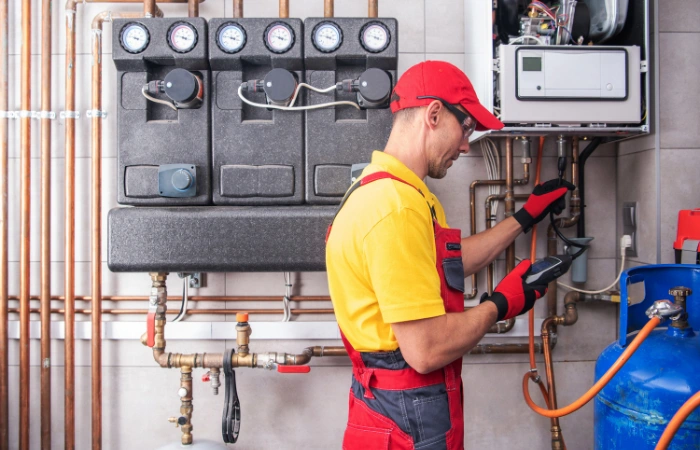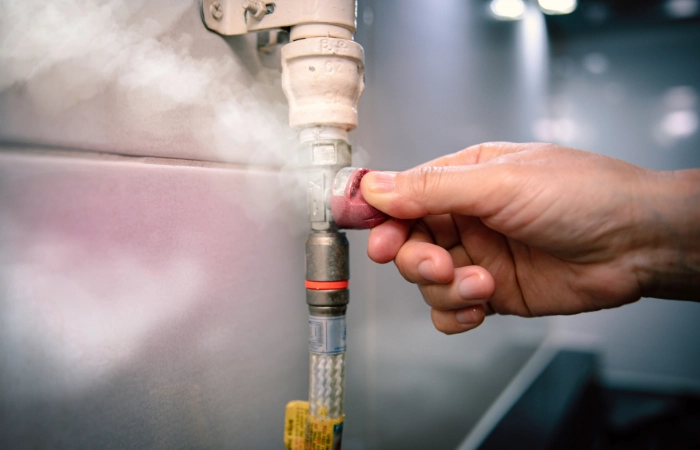
Gas leaks are serious emergencies that need immediate action to ensure safety. Recognizing the signs and knowing what to do can make all the difference in preventing potential disasters like fires or explosions. This guide provides essential steps to take when you suspect a gas leak, from recognizing the telltale sulfur-like odor to safely evacuating the area and contacting emergency services.
Understanding these crucial actions not only helps protect you and your loved ones but also minimizes the risk of health issues associated with gas exposure. Read on to learn how to handle a gas leak emergency effectively and keep your home safe.
What Is Considered a Gas Leak Emergency?
A gas leak emergency occurs when natural gas escapes from pipes or appliances, posing an immediate danger. Indicators include a strong sulfur-like odor, hissing sounds, or visible damage to gas lines. Symptoms such as dizziness, headaches, or nausea may also signal exposure. Immediate actions include evacuating the area, avoiding electrical switches, and contacting emergency services or the gas company. Gas leaks can lead to fires, explosions, or serious health issues, making prompt response crucial for safety.
What to Do During a Gas Leak Emergency
There are several ways to effectively handle a gas leak emergency to ensure your safety and the safety of others around you. Here are eight essential steps to follow, each detailed to help you understand what to do in such a critical situation.
Step 1: Recognize the Signs
Identify common indicators of a gas leak, such as a sulfur-like odor, hissing sounds near gas lines, or dead vegetation around the gas line. Inside your home, you may notice dizziness, headaches, or nausea. Recognizing these signs promptly is crucial, as gas leaks can lead to explosions or serious health issues. Act immediately if you suspect a gas leak to mitigate potential dangers and protect everyone in the vicinity.
Step 2. Evacuate the Area
Once a gas leak is suspected, evacuate the area immediately. Ensure that everyone in the building, including pets, leaves quickly and calmly. Do not use elevators; take the stairs instead. Avoid creating sparks by not using electronic devices or switches. Getting everyone to a safe distance from the leak reduces the risk of inhalation and potential explosions. Gather at a predetermined safe location and perform a headcount to confirm everyone is accounted for.
Step 3: Avoid Using Electrical Devices
A gas leak emergency demands immediate, cautious action. In such a situation, remember that any electrical device, including light switches, phones, or appliances, can be a potential ignition source. Even the simple act of turning on or off a light or using your cell phone indoors could create a spark that might lead to a devastating explosion. Therefore, prioritize your safety and refrain from using any electrical devices until you are a safe distance away from the suspected gas leak. Only then should you use your phone to call for professional assistance.
Step 4: Ventilate the Area
In a gas leak emergency, if it feels safe, open windows and doors to ventilate before evacuating. This helps disperse the gas, but never prioritize ventilation over your safety. If the smell is strong or you feel unwell, evacuate immediately. Remember, ventilation is helpful but not a solution; professional assistance is always needed.
Step 5: Do Not Use Open Flames
Avoid using open flames, such as lighters, matches, or candles, during a gas leak emergency. Any source of ignition can cause the gas to explode. This also means not smoking cigarettes or using gas stoves. The focus should be on eliminating any potential ignition sources. Once you are safe outside, you can then contact emergency services for further assistance.
Step 6: Call Emergency Services
Once safely outside, call your local emergency services or the gas company to report the leak. Provide them with all necessary details, such as the location of the leak and any symptoms you or others are experiencing. Do not return to the building until it has been inspected and cleared by professionals. They will instruct you on the next steps and handle the situation with the expertise needed to ensure safety.
Step 7: Do Not Return Until Safe
After reporting a gas leak emergency, wait for authorities to declare the area safe before returning. They will inspect, identify the cause, and repair the leak. Returning prematurely risks exposure to harmful gas or potential explosions. Follow all instructions from emergency responders to ensure safety before re-entry.
Step 8: Get a Professional Inspection
After experiencing a gas leak emergency, it’s crucial to schedule a professional inspection of your gas appliances and lines to identify and fix any potential issues that could lead to future leaks. Regular maintenance is not just a recommendation, it’s a critical step in ensuring the ongoing safety of your home or business. By taking this proactive measure, you can avoid similar emergencies and have peace of mind knowing your gas systems are operating safely and efficiently.
FAQs

How can I prevent gas leaks in my home?
Preventing a gas leak emergency involves regular maintenance and professional inspection of appliances and pipelines. Promptly repair any damaged equipment and consider installing a gas detector for early leak detection.
What should I do if I smell gas but there are no visible signs of a leak?
If you smell gas but don’t see visible signs, immediately evacuate the area and avoid using electrical devices or open flames. Once you are at a safe distance, call emergency services or your gas company to report the suspected leak.
How do gas companies detect gas leaks?
Gas companies use various methods to detect leaks, including specialized sensors and equipment that can identify gas concentrations in the air. They may also use infrared cameras, ultrasonic detectors, and ground microphones to locate the source of a leak. Routine inspections and monitoring are crucial for early detection and prevention.
What are the health effects of long-term exposure to a gas leak?
Long-term exposure to a gas leak can lead to serious health issues, including respiratory problems, memory loss, and, in severe cases, brain damage due to lack of oxygen and carbon monoxide poisoning. Symptoms may include chronic headaches, fatigue, and confusion. If you suspect a gas leak, it’s vital to evacuate immediately and seek medical attention if you experience any health issues.
Conclusion
Gas leaks are emergencies that require swift and precise action to ensure safety. Recognizing the signs, evacuating promptly, and contacting professionals are critical steps to handle such situations effectively. By staying informed and prepared, you can protect yourself, your loved ones, and your property from the dangers of gas leaks.
In a gas leak emergency, don’t hesitate to contact True Plumbing Solutions. Our experienced team is ready to assist you 24/7, securing your safety and peace of mind. Call us immediately for expert help and professional inspections to prevent future leaks. Your safety is our priority.
